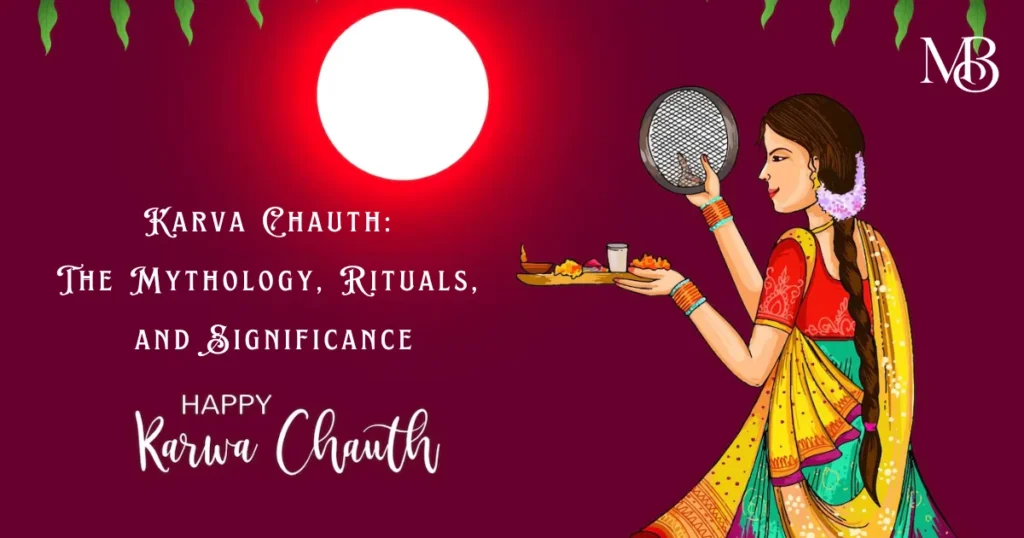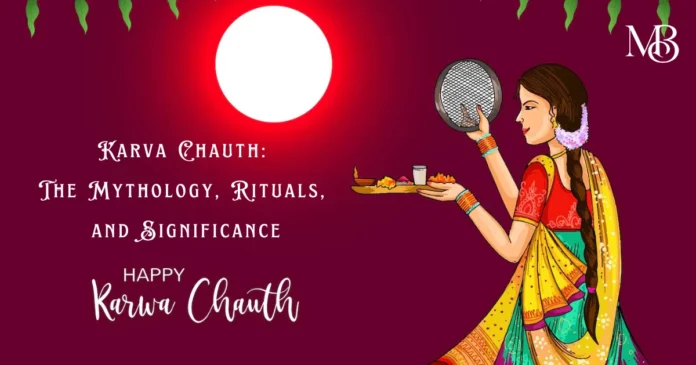Karva Chauth is one of the most celebrated festivals among married Hindu women, especially in Northern India. It represents the deep-rooted connection between tradition, love, and faith. Women observe this festival by fasting from sunrise until moonrise for the longevity and well-being of their husbands. But what are the origins of this festival, its rituals, and its rules? Let’s explore the many facets of Karva Chauth, from mythology to its present-day practices.

The Mythology Behind Karva Chauth
The mythology of Karva Chauth is intertwined with several stories. One of the most popular tales is of Queen Veeravati, a devoted wife who fasted for her husband’s long life. However, upon feeling weak from fasting, her brothers deceived her into breaking her fast early by tricking her into thinking the moon had risen. As a result, her husband died. Devastated, she prayed to the Goddess and was blessed with her husband’s life being restored. This story highlights the faith and devotion of wives towards their husbands.
Another legend is that of Karva, a devoted wife, who saved her husband from the clutches of death by praying fervently to Yama, the God of Death. Moved by her devotion, Yama spared her husband’s life. These stories showcase the significance of love, trust, and dedication between couples.
Read more: The Mythology Behind Karva Chauth: Stories of Devotion, Faith, and Love
Why Do We Celebrate Karva Chauth?
Karva Chauth is celebrated for husbands’ longevity and prosperity. Married women observe fasting, abstaining from food and water throughout the day. This is a symbol of devotion, as women pray for their husbands’ health, protection, and well-being. The festival fosters a sense of unity and celebration among families, often including vibrant cultural rituals, dressing up, and exchanging gifts.
In modern times, it has also become a way for couples to strengthen their bond, as some men also observe the fast along with their wives, promoting equality and mutual respect.
Which Goddess Is Worshipped on Karva Chauth?
On Karva Chauth, women worship Goddess Parvati, who symbolizes marital bliss and strength. Parvati, the consort of Lord Shiva, is known for her undying devotion to her husband. Married women invoke their blessings for a happy and prosperous married life. Along with Parvati, the moon is also revered during the rituals as it represents tranquility, calmness, and the well-being of one’s partner.
Rituals of Karva Chauth
The day of Karva Chauth is filled with several meaningful rituals:
1. Sargi: Before sunrise, women consume “Sargi,” a pre-dawn meal typically sent by the mother-in-law. It consists of fruits, sweets, and other nutritious items to sustain them throughout the day without food or water.
2. Day-long Fast: After Sargi, the fast begins. Women avoid eating or drinking and spend the day praying, getting together with other women, and preparing for the evening puja.
3. Karva Puja: In the evening, a special puja is performed. Women sit in a circle with beautifully adorned thalis (plates) and listen to the “Karva Chauth Katha” (story), narrating the mythological background and the importance of fasting.
4. Moon Sighting: After the puja, women wait for the moonrise. Once the moon is sighted, they offer prayers to the moon, seek blessings, and break their fast by drinking water and eating the first morsel of food from their husband’s hands.
The Scientific Reason Behind Karva Chauth
From a scientific perspective, fasting has several health benefits. It promotes detoxification and improves metabolic health. On a psychological level, it can deepen emotional bonds and create a sense of discipline and patience.
Fasting, when done mindfully, can promote better mental clarity and endurance. It also fosters mindfulness and a sense of connection with the family’s well-being, aligning with the values of care and sacrifice that the festival embodies.
Can We Do Karva Chauth During Periods?
Yes, women can observe Karva Chauth during their menstrual cycle. Traditionally, menstruation was associated with rest and purification, but modern-day practices allow women to continue participating in cultural rituals during their periods, reflecting the shift in societal perceptions of menstruation. While some families may have specific customs or preferences, there are no strict religious prohibitions against fasting or participating in rituals during menstruation.
What Is Not Allowed on Karva Chauth?
While Karva Chauth is a joyous occasion, there are certain restrictions associated with the fast:
1. Eating or Drinking: The primary rule of Karva Chauth is fasting from sunrise to moonrise without consuming any food or water.
2. Avoid Negative Thoughts: Since the festival is all about love, positivity, and blessings, it is encouraged to stay away from negative emotions, arguments, or stress.
3. Non-Observance of Rituals: Missing the Karva Chauth puja or failing to complete the fast may not align with traditional expectations. However, intent and faith play an essential role.
Can an Unmarried Girl Keep Karva Chauth?
Yes, an unmarried girl can keep Karva Chauth. In many regions, unmarried girls observe the fast to pray for a good husband or the well-being of their future partner. While traditionally it is a festival for married women, the symbolism of love and devotion allows unmarried women to partake in the fast with similar intentions.
Who Started Karva Chauth?
The origins of Karva Chauth are believed to date back to ancient times, particularly in the North-Western regions of India. It is said to have started as a way for women to ensure the safety and well-being of their husbands, who often ventured into battles or long journeys. Over time, it evolved into a more cultural and religious festival, celebrating the marital bond.
What Colors Should Be Avoided During Karva Chauth?
While there are no strict rules regarding colors, traditionally, black and white are often avoided, as they are associated with mourning and misfortune in Indian culture. Women typically opt for bright and vibrant colors like red, orange, pink, and gold, which symbolize prosperity, love, and happiness.
Karva Chauth Rules: Dos and Don’ts
Dos:
– Follow the rituals with sincerity and faith.
– Dress in traditional attire, often in shades of red or maroon.
– Break the fast after moonrise with offerings of water and food.
– Pray with a pure heart for your husband’s long life and well-being.
Don’ts:
– Avoid eating or drinking anything during the fast, unless necessary for health reasons.
– Do not engage in negativity, arguments, or stress during the day.
– Avoid missing the evening Karva Chauth puja or moon sighting.
Karva Chauth 2024: Timing, Muhrat, and Duration
Karva Chauth 2024 will fall on Sunday, October 20, 2024. The muhurat for the evening puja and moon sighting is significant. The fast usually begins before sunrise and ends after moonrise. The moonrise time is generally expected between 8:30 PM to 9:30 PM, but it can vary by location. It’s important to follow the local moonrise timings for an accurate end to the fast.
You might also like: Diwali Decoration Ideas 2024: Brighten Up Your School, Office Desk, and Home
Karva Chauth is not merely a ritual but a celebration of love, patience, and devotion. Rooted in age-old traditions, this festival has evolved while still keeping its core values intact. Whether you’re celebrating for the first time or have been observing the fast for years, Karva Chauth is a special occasion to reaffirm the bond of marriage, filled with joy, blessings, and cultural significance. Follow our culture page for more such reads.


